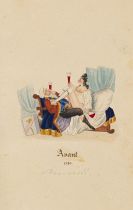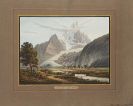
Georg Friedrich Daumer
Nürnberg
1800 -
Würzburg
1875
Georg Friedrich Daumer was born on March 5, 1800, in Nuremberg, Bavaria. Daumer began studying theology in Erlangen in 1817. He joined a pietistic circle of students, to which the philosopher Ludwig Feuerbach later belonged. Because his preaching concept was criticized as either too rationalistic or too mystical by his professors, he quit his theological studies and began studying philology in Leipzig.
From 1823 until 1828, Georg Friedrich Daumer worked as a professor at the Gymnasium in Nuremberg. He taught the famous foundling Kaspar Hauser from 1828 to 1831. Daumer assumed that this mysterious boy could be the son of Grand Duke Karl of Baden, who was born in 1812, and he wrote four essays on the obscure origin and development of Hauser. He began publishing mainly religious-philosopical writings in 1832. These sharply criticized Protestant Christianity and especially Pietism and were influenced primarily by the writings of Georg Wilhelm Friedrich Hegel and Friedrich Wilhelm Joseph Schelling.
In 1847, his main work appeared, "Die Geheimnisse des christlichen Alterthums" (The Secrets of Christian Antiquity), in which Georg Friedrich Daumer even criticized the person of Jesus Christ, in contrast to the later Friedrich Nietzsche, who never did. He described his own very Romantic world view as "theistic naturalism" or "theistic materialism." Although he is usually regarded as an opponent of the theologist and philosopher David Friedrich Strauß, Georg Friedrich Daumer can be considered his precursor in relation to Strauß' method of Bible criticism.
Besides his religious-philosophical writings, he also published love poetry and translations of oriental poetry, including "Hafis. Eine Sammlung persischer Gedichte," in which he (quite freely) translated the poetry of Hafez, a Persian poet and mystic from the 14th century. Many of his poems and translations were set to music by Johannes Brahms, keeping them alive into the present day. In 1856, Daumer moved to Frankfurt am Main, then later to Würzburg, where he worked as a private scholar until his death.
Georg Friedrich Daumer died in Würzburg on December 13, 1875.
Would you like to sell a work by Georg Friedrich Daumer?
Infos for seller












